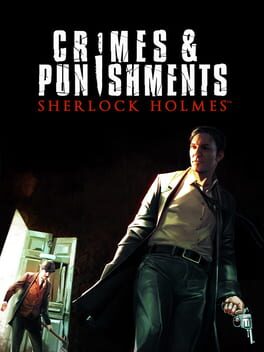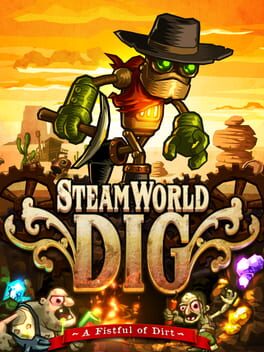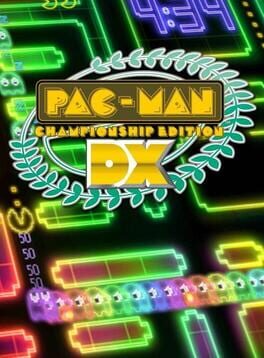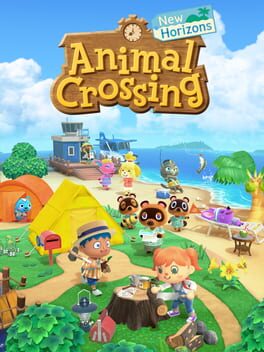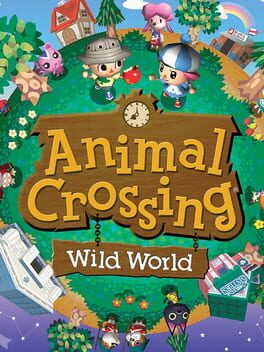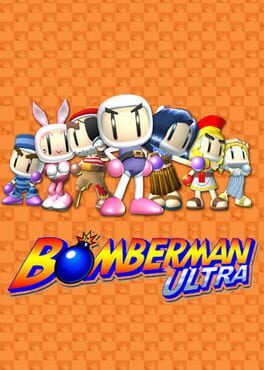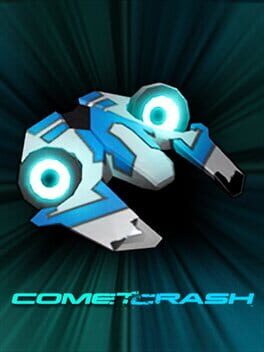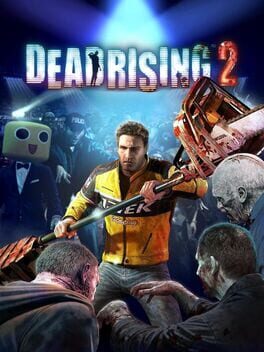Lucca202
BACKER
Sherlock Holmes: Crimes & Punishments is a 3D adventure game that follows the titular director in a series of cases across Britain. Each case has him travelling between locations, searching for clues, questioning people and making deductions in order to point out the culprit.
The game strikes a nice balance between linear storytelling and detective work: it forces the player to get every relevant clue and solving all puzzles before proceeding to the next parts of each case, while also allowing for them to take on some more open-ended tasks by making links between pieces of evidence on their own and arriving at the conclusion they want.
On that note, I particularly like how the developers mapped Sherlock's abilities to gameplay. There are two (admittedly underused) forms of detective mode, one centered around deductive reasoning and another, around his imagination. The player can also profile people by pointing out details on their person as the camera pans around them.
Last, but not least, there's a deduction screen that contains the information gathered until that point in the case. Here, the player is able to decide on what they think are relevant -- for instance, is the explanation offered by a certain suspect satisfactory, or are they lying to conceal their involvement? Is an event a coincidence or an important link? By making these choices, different conclusions start to form, with the player ultimately deciding on who to pin the blame on, and whether or not to turn them in. Your choices lead to a different ending to the case, but the game continues regardless of whether you were correct or not.
A friend described C&P to me as the archetypal 7/10 game, and having completed every case, I think I agree. It's not mindblowing, but is a pretty fun time, and while it's clunky, that clunkiness never becomes particularly bothersome. Heck, if a puzzle or minigame proves too annoying, and some of them will, you can even skip it with no penalty whatsoever. The game is pretty honest about its own level of polish.
So if you're looking for a detective thriller to spend a weekend on, check out the Frogwares take on Sherlock Holmes. They're a good rendition of the legendary detective, and are definitely worth your time.
The game strikes a nice balance between linear storytelling and detective work: it forces the player to get every relevant clue and solving all puzzles before proceeding to the next parts of each case, while also allowing for them to take on some more open-ended tasks by making links between pieces of evidence on their own and arriving at the conclusion they want.
On that note, I particularly like how the developers mapped Sherlock's abilities to gameplay. There are two (admittedly underused) forms of detective mode, one centered around deductive reasoning and another, around his imagination. The player can also profile people by pointing out details on their person as the camera pans around them.
Last, but not least, there's a deduction screen that contains the information gathered until that point in the case. Here, the player is able to decide on what they think are relevant -- for instance, is the explanation offered by a certain suspect satisfactory, or are they lying to conceal their involvement? Is an event a coincidence or an important link? By making these choices, different conclusions start to form, with the player ultimately deciding on who to pin the blame on, and whether or not to turn them in. Your choices lead to a different ending to the case, but the game continues regardless of whether you were correct or not.
A friend described C&P to me as the archetypal 7/10 game, and having completed every case, I think I agree. It's not mindblowing, but is a pretty fun time, and while it's clunky, that clunkiness never becomes particularly bothersome. Heck, if a puzzle or minigame proves too annoying, and some of them will, you can even skip it with no penalty whatsoever. The game is pretty honest about its own level of polish.
So if you're looking for a detective thriller to spend a weekend on, check out the Frogwares take on Sherlock Holmes. They're a good rendition of the legendary detective, and are definitely worth your time.
2012
Another one of Amanita Design's point-'n-clicks, Botanicula certainly explains why the studio is named after a hallucinogenic mushroom. The game is set in a microscopic world, filled with whimsical creatures, but that is threatened by a foreign presence. It's all very surreal, and while I'm not sure how the competition looks like these days, at the time, I remember calling it the trippiest game you could buy on Steam.
Like Amanita's previous games, Botanicula is a competent point-'n-click adventure that's very charming and approachable, though I do feel that the fact that it's less grounded in reality (much less than Samorost and Machinarium, at least) makes some puzzles a bit too obtuse. Still, it's a fun game to play with someone that isn't too experienced with videogames.
Like Amanita's previous games, Botanicula is a competent point-'n-click adventure that's very charming and approachable, though I do feel that the fact that it's less grounded in reality (much less than Samorost and Machinarium, at least) makes some puzzles a bit too obtuse. Still, it's a fun game to play with someone that isn't too experienced with videogames.
2013
Like a fistful of dirt to the face.
SteamWorld Dig is a 3DS downloadable title starring robot prospector Rusty, who inherited his missing uncle's mine. Shortly after arriving, Rusty finds his uncle’s "body" inside the caves, and with nothing else to do, decides to explore the mine in hopes of finding... something?
SteamWorld Dig has some of the laziest, cheapest storytelling on the 3DS. As the game begins, you just dig yourself into an ever deeper hole because maybe your uncle had a reason for you to do so, I guess, probably, and the entire game just keeps being handwavy like that, all the way to the (incredibly vague and disappointing) ending. Do the thing and maybe you'll find a reason. And it really hurts, because the experience desperately needed some motivation to go on.
Gameplay revolves around digging deeper and deeper in the mine, with frequent returns to town to sell off minerals and buy upgrades. The mine is randomly generated for the save file, but you'll find entrances to caves that offer a fixed, platforming stage, at the end of which you'll mostly acquire a new ability, Metroidvania style, which you can use on the next cave.
These cave sections are brief, yet they represent the only real content in the game, the one part that was carefully crafted. The mining part, which makes up the bulk of the experience, is clearly just there to waste time, to a point where the game has to contrive a reason -- low inventory space that needs to be upgraded -- for you to waste time going back to town.
And it hurts to see that there could have been a real game here: controlling Rusty feels great, especially when he’s fully upgraded at the end game and can rapidly move through maps. He's very well animated to boot. On a more fleshed out game, it could have shined, but on this one, it’s all wasted. Were it not for the fact that I could play the 3DS version on the go, I wouldn't even have finished the game, which is pretty damning considering it’s about five hours long. Awful.
SteamWorld Dig is a 3DS downloadable title starring robot prospector Rusty, who inherited his missing uncle's mine. Shortly after arriving, Rusty finds his uncle’s "body" inside the caves, and with nothing else to do, decides to explore the mine in hopes of finding... something?
SteamWorld Dig has some of the laziest, cheapest storytelling on the 3DS. As the game begins, you just dig yourself into an ever deeper hole because maybe your uncle had a reason for you to do so, I guess, probably, and the entire game just keeps being handwavy like that, all the way to the (incredibly vague and disappointing) ending. Do the thing and maybe you'll find a reason. And it really hurts, because the experience desperately needed some motivation to go on.
Gameplay revolves around digging deeper and deeper in the mine, with frequent returns to town to sell off minerals and buy upgrades. The mine is randomly generated for the save file, but you'll find entrances to caves that offer a fixed, platforming stage, at the end of which you'll mostly acquire a new ability, Metroidvania style, which you can use on the next cave.
These cave sections are brief, yet they represent the only real content in the game, the one part that was carefully crafted. The mining part, which makes up the bulk of the experience, is clearly just there to waste time, to a point where the game has to contrive a reason -- low inventory space that needs to be upgraded -- for you to waste time going back to town.
And it hurts to see that there could have been a real game here: controlling Rusty feels great, especially when he’s fully upgraded at the end game and can rapidly move through maps. He's very well animated to boot. On a more fleshed out game, it could have shined, but on this one, it’s all wasted. Were it not for the fact that I could play the 3DS version on the go, I wouldn't even have finished the game, which is pretty damning considering it’s about five hours long. Awful.
2010
2021
A ship sails from England to America. Under the starry sky, a couple stares out into the sea, the husband, an investor on the verge of financial collapse, and the wife, a former actress growing increasingly frustrated with her marriage. She beckons him over to the edge of the deck, and as he leans over the rail, she shoves him over the edge. With the ship mere hours away from its destination, the now-widow moves to avoid suspicion from her fellow passengers so she can start a new life on the new continent.
Overboard! is a murder mystery where you’re the one whodunnit. You play as Veronica Villinsey, a woman who, tired of her marriage to Malcolm Villinsey, decides to take “until death do us part” into her own hands. As you take control of her, in the morning after her deed, the ship is eight hours away from America, eight long hours during which you must evade any suspicion from the people in the ship. Things get more complicated as it becomes clear that her crime might not have gone entirely unnoticed.
The game plays out in visual novel style, your only inputs being moving to other areas of the ship via the map and interacting with select objects or talking to people in the room via text prompts. All of these actions shave precious minutes from the clock, and as the day progresses, other characters move around the ship tending to their own schedules, and your actions — or inactions — regarding certain topics decide what sort of ending Veronica gets. It’s not possible to see every event in one go, so you must plan your movements according to the desired outcomes.
Overboard is very short, and you’ll see the conclusion of Veronica’s journey — be it good or bad — in fifteen minutes or less. However, it’s very unlikely that you will achieve the best ending right off the bat, and the game nudges you in the way of exploring all the possibilities and aim for different events in further playthroughs.
I enjoy focused games that choose to do one thing very well, and Overboard has some genuinely good ideas to go with its witty writing. I like, for instance, how some dialogue options look innocuous but are straight-up traps. For instance, if you talk about your husband in the past tense, the listener might grow suspicious of you. You're also required to keep a consistent story about his disappearance throughout the day, with dialogue trees giving you plenty of space to contradict yourself.
In theory, there's a lot that can be done with the mechanics that Overboard offers. In practice, however, I found exploring different paths incredibly annoying. For one, the UI is really unhelpful, with the fast-forward and rewind functions being unusable, and this makes repeat playthroughs a bit of a chore. But more than that, the game seems to struggle with its own scope.
Creating a game where the player has a lot of freedom to make decisions is not easy, not is one where NPCs move around and can interact. The cost of developing those things grows exponentially as you add them -- a new decision changes the scenes that succede it, and a new character's schedule and behaviour affects all the others.
Overboard's developers were aware of that, and created a game with a limited cast and not that many different choices. It's a very reasonable idea development-wise, but it means that a lot of dialogue options are pointless and funnel you to the same outcomes, and some ideas a player might have that sound reasonable are simply not possible to execute.
Furthermore, even at the limited scope of interaction the game offers, it still drops the ball a surprising amount of times. The line between a solution to a problem that works and one that doesn't is arbitrary, and sometimes, inconsistent. An example of this is seen if you decide to do additional murders to cover your tracks, where you can get away even if you're seen carrying them out depending on unknown factors.
Overboard is a low-priced game that's clearly experimental, and also one of those rare games that have you play as the villain. If you're curious about it, try it. I certainly don't regret doing so. But I also think it's unlikely that I'll be revisiting or even remembering it any time soon.
Overboard! is a murder mystery where you’re the one whodunnit. You play as Veronica Villinsey, a woman who, tired of her marriage to Malcolm Villinsey, decides to take “until death do us part” into her own hands. As you take control of her, in the morning after her deed, the ship is eight hours away from America, eight long hours during which you must evade any suspicion from the people in the ship. Things get more complicated as it becomes clear that her crime might not have gone entirely unnoticed.
The game plays out in visual novel style, your only inputs being moving to other areas of the ship via the map and interacting with select objects or talking to people in the room via text prompts. All of these actions shave precious minutes from the clock, and as the day progresses, other characters move around the ship tending to their own schedules, and your actions — or inactions — regarding certain topics decide what sort of ending Veronica gets. It’s not possible to see every event in one go, so you must plan your movements according to the desired outcomes.
Overboard is very short, and you’ll see the conclusion of Veronica’s journey — be it good or bad — in fifteen minutes or less. However, it’s very unlikely that you will achieve the best ending right off the bat, and the game nudges you in the way of exploring all the possibilities and aim for different events in further playthroughs.
I enjoy focused games that choose to do one thing very well, and Overboard has some genuinely good ideas to go with its witty writing. I like, for instance, how some dialogue options look innocuous but are straight-up traps. For instance, if you talk about your husband in the past tense, the listener might grow suspicious of you. You're also required to keep a consistent story about his disappearance throughout the day, with dialogue trees giving you plenty of space to contradict yourself.
In theory, there's a lot that can be done with the mechanics that Overboard offers. In practice, however, I found exploring different paths incredibly annoying. For one, the UI is really unhelpful, with the fast-forward and rewind functions being unusable, and this makes repeat playthroughs a bit of a chore. But more than that, the game seems to struggle with its own scope.
Creating a game where the player has a lot of freedom to make decisions is not easy, not is one where NPCs move around and can interact. The cost of developing those things grows exponentially as you add them -- a new decision changes the scenes that succede it, and a new character's schedule and behaviour affects all the others.
Overboard's developers were aware of that, and created a game with a limited cast and not that many different choices. It's a very reasonable idea development-wise, but it means that a lot of dialogue options are pointless and funnel you to the same outcomes, and some ideas a player might have that sound reasonable are simply not possible to execute.
Furthermore, even at the limited scope of interaction the game offers, it still drops the ball a surprising amount of times. The line between a solution to a problem that works and one that doesn't is arbitrary, and sometimes, inconsistent. An example of this is seen if you decide to do additional murders to cover your tracks, where you can get away even if you're seen carrying them out depending on unknown factors.
Overboard is a low-priced game that's clearly experimental, and also one of those rare games that have you play as the villain. If you're curious about it, try it. I certainly don't regret doing so. But I also think it's unlikely that I'll be revisiting or even remembering it any time soon.
I played this game for over a year before putting it down to play the then newly released 4th generation of Pokémon. Compared to new entries in the series, especially New Horizons, it does feel a little barebones, but at the time, it felt incredibly ambitious and fresh.
Back then, I also relied a lot on the game to help me with the loneliness and depression that plagued my teenage years. That gap that would also eventually be filled by Pokémon, which helped me make new friends, some of which are with me to this day. Before that happened, though, it was caring for my isolated city and talking to Apollo, Marina, and others, that gave me joy.
So it's a complicated relationship I have with this game. Even though it's aged, and even though I would never recommend playing it and I will never do so again, it will always have this warm place in my heart to itself.
Back then, I also relied a lot on the game to help me with the loneliness and depression that plagued my teenage years. That gap that would also eventually be filled by Pokémon, which helped me make new friends, some of which are with me to this day. Before that happened, though, it was caring for my isolated city and talking to Apollo, Marina, and others, that gave me joy.
So it's a complicated relationship I have with this game. Even though it's aged, and even though I would never recommend playing it and I will never do so again, it will always have this warm place in my heart to itself.
2009
2009
2010
I hear the first game is far better, and someday, maybe I'll still try it. This one has an atrocious plot and rather broken gameplay. I remember being most of the game without the dodge roll skill, which made most bosses really cheap. To add insult to injury, it had online modes that were unstable and mechanically poor, the kind of thing you'd find in games in the early 2010s to tick a box in marketing that says "multiplayer".
